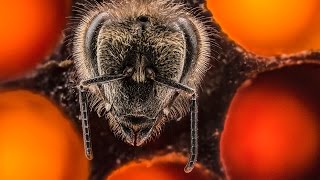(单词翻译:单击)
These bees are in my backyard in Berkeley, California.
这些蜜蜂,生活在我位于加州伯克利市的家的后院里。
Until last year, I'd never kept bees before, but National Geographic asked me to photograph a story about them,
直到去年之前,我从没养过蜜蜂,但是《国家地理》邀请我拍摄一组关于它们的照片,
and I decided, to be able to take compelling images, I should start keeping bees myself.
然后我决定,为了拍出一些令人叹服的照片,我应该开始自己养蜂。
And as you may know, bees pollinate one third of our food crops, and lately they've been having a really hard time.
正如你们可能知道的,蜜蜂为我们三分之一的粮食作物授粉,而最近它们却经历了一个非常困难的时期。
So as a photographer, I wanted to explore what this problem really looks like.
因此作为一个摄影师,我想对这个问题的真相一探究竟。
So I'm going to show you what I found over the last year.
所以我将要向你们展示我去年的发现。
This furry little creature is a fresh young bee halfway emerged from its brood cell,
这个毛茸茸的小动物是一只从蜂巢中露出半个身子的幼蜂,
and bees right now are dealing with several different problems, including pesticides, diseases, and habitat loss,
而蜜蜂们现在正面临几个问题,包括农药、疾病以及栖息地的丧失,
but the single greatest threat is a parasitic mite from Asia, Varroa destructor.
但最大的威胁是一种来自亚洲的寄生螨,瓦螨。
And this pinhead-sized mite crawls onto young bees and sucks their blood.
这种针头大小的螨虫会爬向幼蜂然后吸它们的血。
This eventually destroys a hive because it weakens the immune system of the bees,
这实际上会毁掉一个蜂巢,因为它会减弱蜜蜂的免疫系统,
and it makes them more vulnerable to stress and disease.
使它们更容易受到压力和疾病的伤害。
Now, bees are the most sensitive when they're developing inside their brood cells,
当蜜蜂在蜂巢中发育的时候是它们最敏感的时期,
and I wanted to know what that process really looks like,
而我想要了解这个过程是怎样的,
so I teamed up with a bee lab at U.C. Davis and figured out how to raise bees in front of a camera.
所以我跟加州大学戴维斯校区的一个蜜蜂实验室合作,并且琢磨出如何在摄像机前养蜜蜂。
I'm going to show you the first 21 days of a bee's life condensed into 60 seconds.
我将在接下来的60秒里,浓缩地向你们展示一只蜜蜂生命最初的21天。
This is a bee egg as it hatches into a larva,
这是一个正在孵化为幼虫的蜂卵,
and those newly hatched larvae swim around their cells feeding on this white goo that nurse bees secrete for them.
这些初孵幼虫在它们的蜂巢中游动,以这种保育蜂分泌的白色粘性物为食。
Then, their head and their legs slowly differentiate as they transform into pupae.
然后,它们的头和腿在它们变成蛹的过程中慢慢地分化。
Here's that same pupation process, and you can actually see the mites running around in the cells.
这是跟上面相同的蛹化过程,你可以看到螨虫在这些蜂巢中爬行。
Then the tissue in their body reorganizes and the pigment slowly develops in their eyes.
然后它们身体组织开始重组,而色素也慢慢地在它们的眼睛中发展。
The last step of the process is their skin shrivels up and they sprout hair. So...
这个过程的最后一步是它们的皮肤皱缩,并且长出茸毛。因此...
As you can see halfway through that video, the mites were running around on the baby bees,
正如你在视频中所看到的,这些螨虫在小蜜蜂中爬行,
and the way that beekeepers typically manage these mites is they treat their hives with chemicals.
而养蜂人治理这些螨虫的典型做法就是在蜂房里使用化学药品。

In the long run, that's bad news, so researchers are working on finding alternatives to control these mites.
长远来看,这是一个坏消息,因此研究人员正在寻找治理这些螨虫的替代方案。
This is one of those alternatives. It's an experimental breeding program at the USDA Bee Lab in Baton Rouge,
以下是这些替代方案中的一个。这是位于巴吞鲁日的美国农业部蜜蜂实验室的一个试验性育种计划,
and this queen and her attendant bees are part of that program.
这只蜂后和她的工蜂是这个计划的一部分。
Now, the researchers figured out that some of the bees have a natural ability to fight mites,
研究人员了解到有些蜜蜂天生拥有抗螨的能力,
so they set out to breed a line of mite-resistant bees.
所以它们被选出来培育抗螨的蜜蜂。
This is what it takes to breed bees in a lab.
这就是在实验室培育蜜蜂的情景。
The virgin queen is sedated and then artificially inseminated using this precision instrument.
先给这只蜂后施以镇静剂,然后使用这个精密的仪器对它进行人工授精。
Now, this procedure allows the researchers to control exactly which bees are being crossed,
这个过程使得研究人员可以准确地控制使用哪些蜜蜂来进行杂交,
but there's a tradeoff in having this much control.
但是这种控制也有一个弊端。
They succeeded in breeding mite-resistant bees,
他们成功地培育出了抗螨虫的蜜蜂,
but in that process, those bees started to lose traits like their gentleness and their ability to store honey,
但在这个过程中,这些蜜蜂也开始失去一些特性,比如它们温顺的性格以及储存蜂蜜的能力,
so to overcome that problem, these researchers are now collaborating with commercial beekeepers.
因此为了克服这个弊端,这些研究人员正与商业养蜂人进行合作。
This is Bret Adee opening one of his 72,000 beehives.
这是布雷特·埃德正在打开他拥有的72000个蜂箱中的一个。
He and his brother run the largest beekeeping operation in the world,
他和他的兄弟经营着世界上规模最大的养蜂活动,
and the USDA is integrating their mite-resistant bees into his operation with the hope that over time,
而美国农业部正将自己的抗螨蜜蜂整合到他的蜜蜂中去,并希望经过一段时间,
they'll be able to select the bees that are not only mite-resistant but also retain all of these qualities that make them useful to us.
他们能选育出一些不仅抗螨,而且还保有那些对我们有用的特质的蜜蜂。
And to say it like that makes it sound like we're manipulating and exploiting bees,
这样说来好像我们是在操纵和利用蜜蜂,
and the truth is, we've been doing that for thousands of years.
而事实是,我们已经这样做了几千年了。
We took this wild creature and put it inside of a box,
我们将这种野生生物放进箱子里,
practically domesticating it, and originally that was so that we could harvest their honey,
对它进行驯养,我们这样做,原本就是为了收获它们的蜂蜜,
but over time we started losing our native pollinators, our wild pollinators,
但是随着时间的推移,我们开始失去我们的本地传粉者--我们的野生传粉者,
and there are many places now where those wild pollinators can no longer meet the pollination demands of our agriculture,
并且现在,在很多地方这些野生传粉者对于我们的农业来说是供不应求,
so these managed bees have become an integral part of our food system.
所以这些被管理起来的蜜蜂,已经成为我们的食品系统的组成部分。
So when people talk about saving bees,
所以当人们谈论拯救蜜蜂时,
my interpretation of that is we need to save our relationship to bees, and in order to design new solutions,
我对此的解释是我们需求拯救我们跟蜜蜂的关系,而为了设计新的解决方案,
we have to understand the basic biology of bees and understand the effects of stressors that we sometimes cannot see.
我们得去了解蜜蜂最基础的生物特质,去了解那些我们无法看见的压力对它们产生的影响。
In other words, we have to understand bees up close. Thank you.
换句话说,我们得更贴近地去了解蜜蜂。谢谢。


